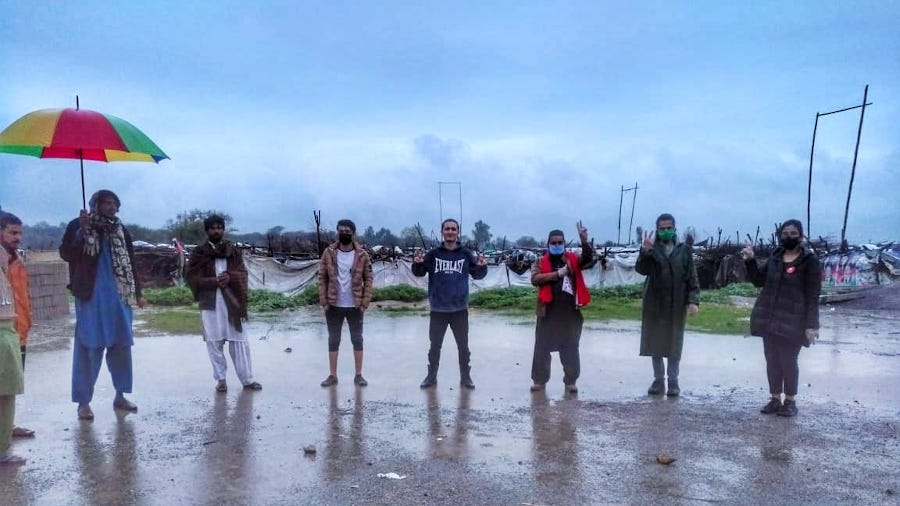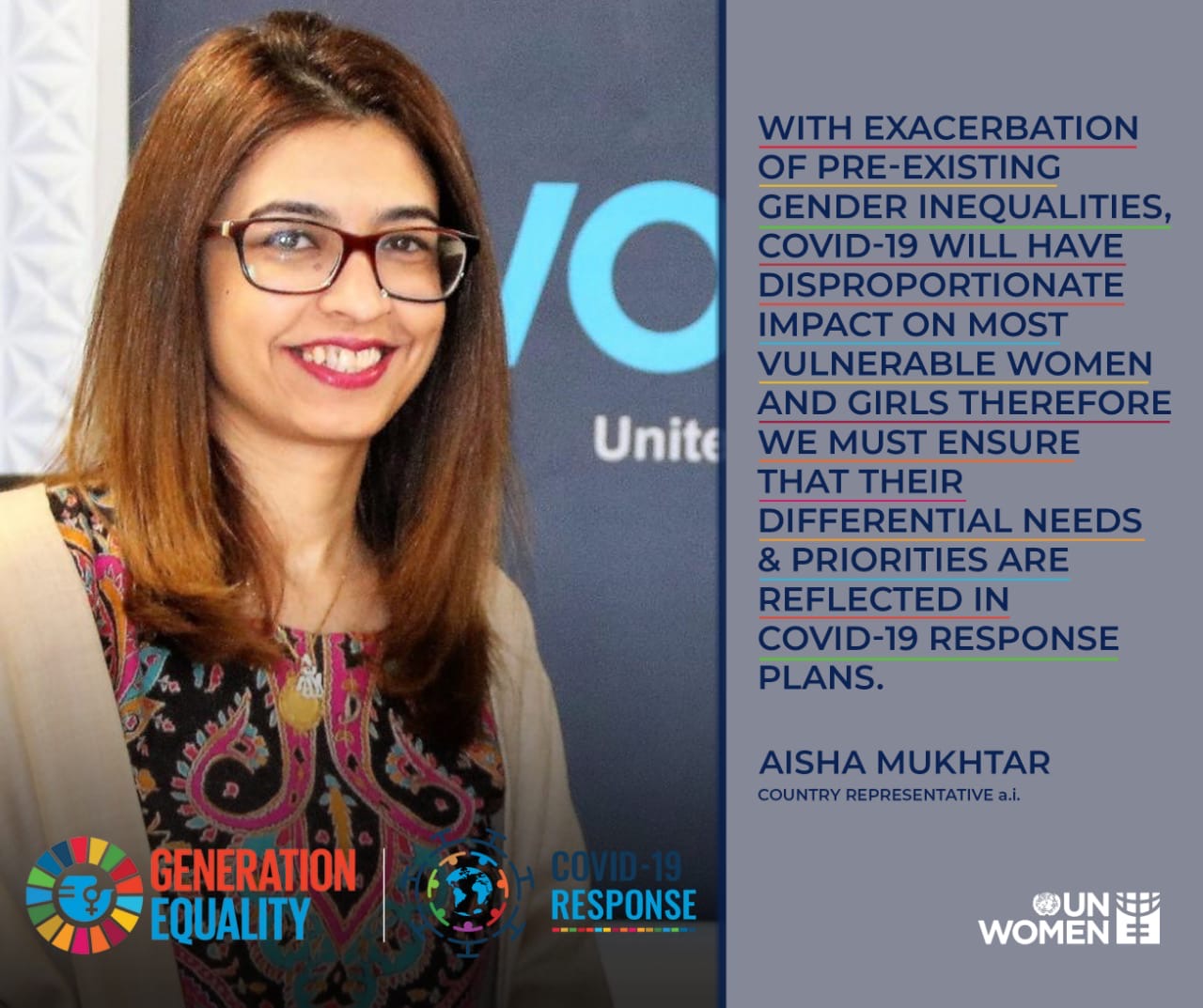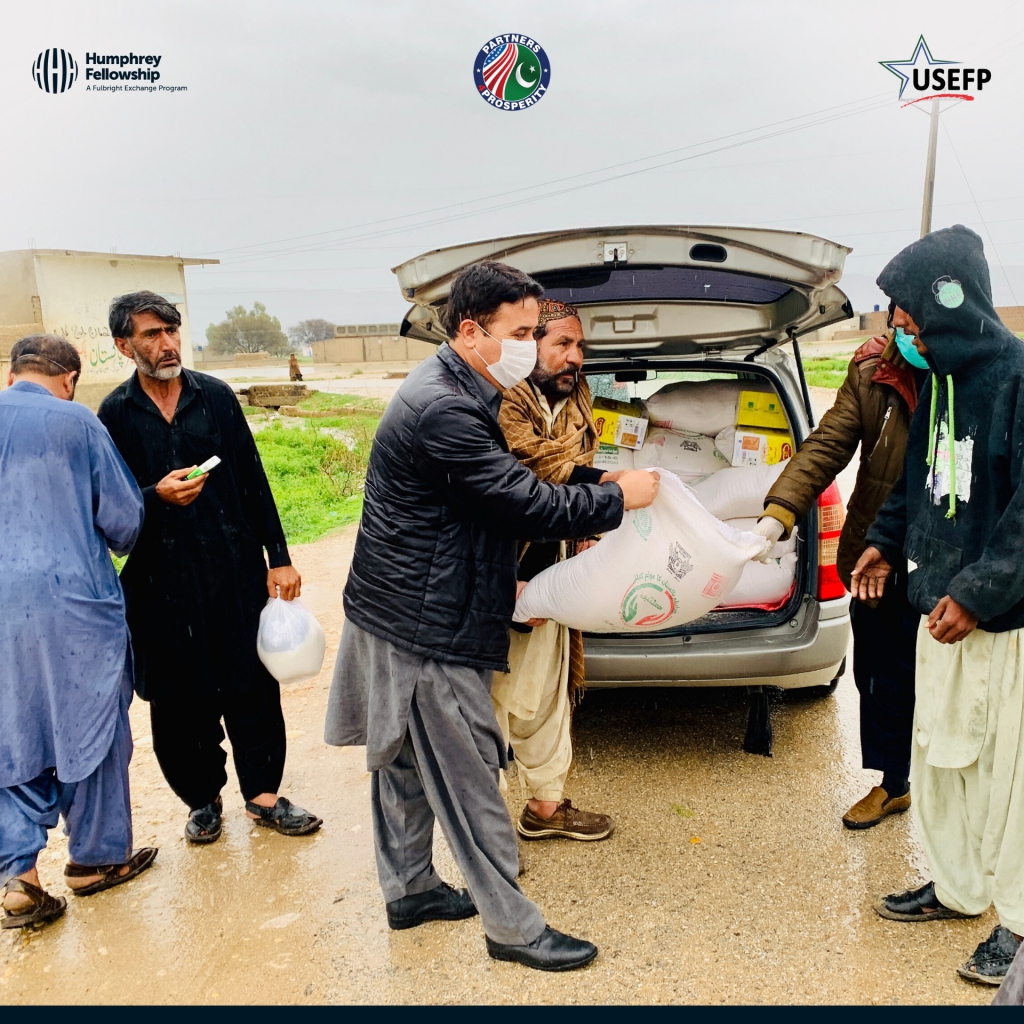Over the years, USEFP alumni have proven that they are committed to using the knowledge and skills learned on their exchange experiences in the U.S. to drive positive change in Pakistan. During Covid-19 this commitment has been reaffirmed, as many Fulbright and Humphrey alumni have set up initiatives to help those affected by the pandemic. These efforts have included ration donation drives, measures to increase accessibility of health services in remote areas, improving testing methodologies, and awareness campaigns.
Some of the alumni who have stepped up during this time of crisis, shared their contributions with USEFP:
Ibrahim Bashir (Fulbright Master’s Louisiana State University)
“The Corona Solidarity Campaign was formed in response to the spread of the COVID19 pandemic and the subsequent lockdown imposed on cities in Pakistan. A number of progressive groups and individuals in Islamabad and Rawalpindi formed the CSC in order to provide emergency food supplies to the communities worst affected by the lockdown, especially katchi abadis. Households are provided with a ration pack consisting of essential food supplies for a month, hygiene products and cash. We are also trying to provide PPE to essential health workers who are working hard to help those affected. The Corona Solidarity Campaign is founded on the principles of mutual aid, rather than charity. The campaign is citizen-led and organized around helping fellow citizens in need, filling in the gaps left by the state structure. The aim of this campaign is to extend solidarity by linking those with resources to the people who have built our cities but find themselves without adequate social safety nets. Till date, close to a 1000 ration boxes (a month’s worth of products) have been distributed across 150 neighborhoods in the twin cities, besides 500 PPE kits to frontline medical workers and staff.”

The Corona Solidarity Campaign provided supplies to the communities worst affected by the virus (Picture Credit: coronasolidaritypk.org)
Babar Malik (Fulbright Master’s Southern Illinois University)
“The majority of Pakistan’s population resides in rural areas and specialist medical services are concentrated in urban centers. To access these services, a rural patient wastes thousands of Rupees and between 4 to 10 hours of travel time, in addition to the actual medical expenditure. This is not taking into consideration lost wages from employee absenteeism. ImPakt Healthcare is working to provide practical and sustainable solutions for this challenge. ImPakt Healthcare is a social enterprise formed by a group of energetic and internationally educated physicians & business managers who came together with one sole purpose: to make quality, affordable health care more accessible to underserved populations. Impakt Foundation will be providing free of cost consultation. In the recent time of need, our consultants will answer health related queries online. ImPakt Foundation is working to provide practical and sustainable solutions for this challenge.”
Fayyaz ul Amir Afsar Minhas (Fulbright PhD Colorado State University)
“We have developed a computational modeling approach called Agglomerative Sampling that can reduce the number of tests required for COVID-19 testing in the population through a computer-science inspired pooling strategy. One of the challenges in the current Covid-19 crisis is the time and cost of performing tests, especially for large-scale population surveillance. Since the probability of testing positive in large population studies is expected to be small (<15 percent), therefore, most of the test outcomes will be negative. Here, we propose the use of agglomerative sampling which can prune out multiple negative cases in a single test by intelligently combining samples from different individuals. The proposed scheme builds on the assumption that samples from the population may not be independent of each other. Our simulation results show that the proposed sampling strategy can significantly increase testing capacity under resource constraints: on average, a saving of ~40 percent tests can be expected assuming a positive test probability of 10 percent across the given samples. The proposed scheme can also be used in conjunction with heuristic or Machine Learning guided clustering for improving the efficiency of large-scale testing further. The code for generating the simulation results for this work is available here, and our preprint is available here.

Ayesha Mukhtar has been working to integrate gender in preparedness and response plans towards Covid-19
Aisha Mukhtar (Fulbright Master’s Harvard University)
“Apart from posing critical health challenges, Covid-19 outbreak is exposing the pre-existing inequalities in our societies with potentially strong adverse impact on most vulnerable and excluded groups including women and girls. Leading to exacerbation of the existing multidimensional gender inequalities, the crisis will have a disproportionate impact on women and girls therefore it is critical to understand gendered dimensions of Covid-19 and ensure that women’s differential needs are addressed in response plans. As Country Representative a.i. of UN Women Pakistan, I am leading the organization’s initiatives to support UN system and national and provincial governments to integrate gender in preparedness and response plans. This includes immediate measures to minimize and mitigate economic impact of Covid-19 on women and girls, especially women with disabilities and transgender persons; and designing medium to long-term economic recovery solutions to support women in informal sector. In order to address new and increased risk of violence against women in the context of Covid-19 due to movement restrictions and temporary suspension of support services; UN Women is supporting government and NGOs to ensure uninterrupted service provision through introduction of technology-based solutions for helplines in order to enhance survivors’ access to services during lockdown.”
Rahim Khetran (Humphrey Fellow at University of Minnesota)
Me and my friend initiated the Balochistan Development Campaign (BDC) in order to work for the progressive development of our province. BDC is a youth-lead initiative and volunteer group which intends to engage, mobilize, and strengthen youth voices and participation in the socio-economic and political development of Pakistan, especially Balochistan. During the Covid-19 pandemic, BDC, with the help of volunteers has been able to distribute one month’s groceries for a family of four members, among 125 families of district Barkhan & Kohlu. BDC is also working to promote awareness about the relief measures and initiatives taken by the Government of Pakistan though social media, and sharing preventive measures suggested by the Government of Pakistan and other health experts to curtail spread in community.
